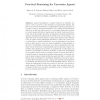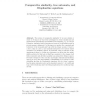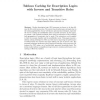465 search results - page 45 / 93 » Knowledge and the Problem of Logical Omniscience |
JELIA
2004
Springer
14 years 2 months ago
2004
Springer
Logical formalisation of agent behaviour is desirable, not only in order to provide a clear semantics of agent-based systems, but also to provide the foundation for sophisticated r...
KR
2004
Springer
14 years 2 months ago
2004
Springer
Disjunction is generally considered to add expressive power to logic programs under the stable model semantics, which have become a popular programming paradigm for knowledge repr...
LPAR
2005
Springer
14 years 2 months ago
2005
Springer
The notion of comparative similarity ‘X is more similar or closer to Y than to Z’ has been investigated in both foundational and applied areas of knowledge representation and r...
EUSFLAT
2009
13 years 6 months ago
2009
The word Interpretability is becoming more and more frequent in the fuzzy literature. It is admitted as the main advantage of fuzzy systems and it should be given a main role in fu...
DLOG
2006
13 years 10 months ago
2006
Abstract. Modern description logic (DL) reasoners are known to be less efficient for DLs with inverse roles. The current loss of performance is largely due to the missing applicabi...



